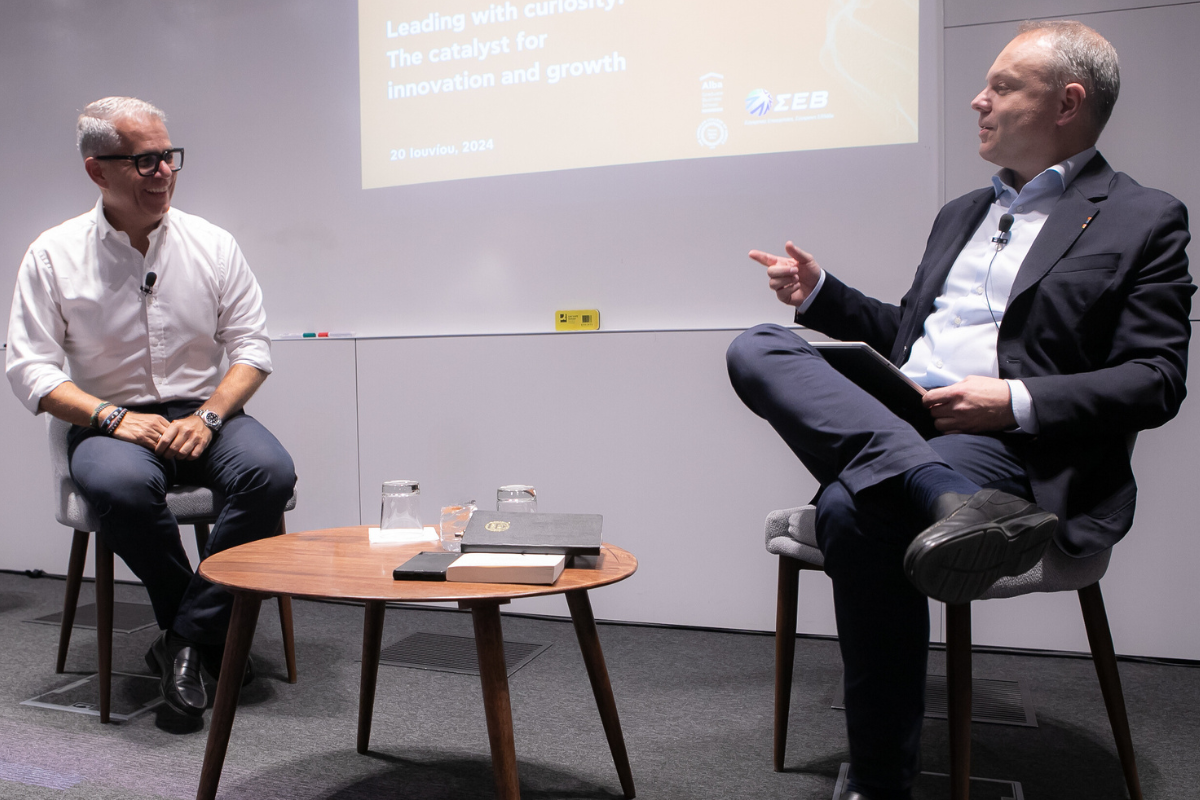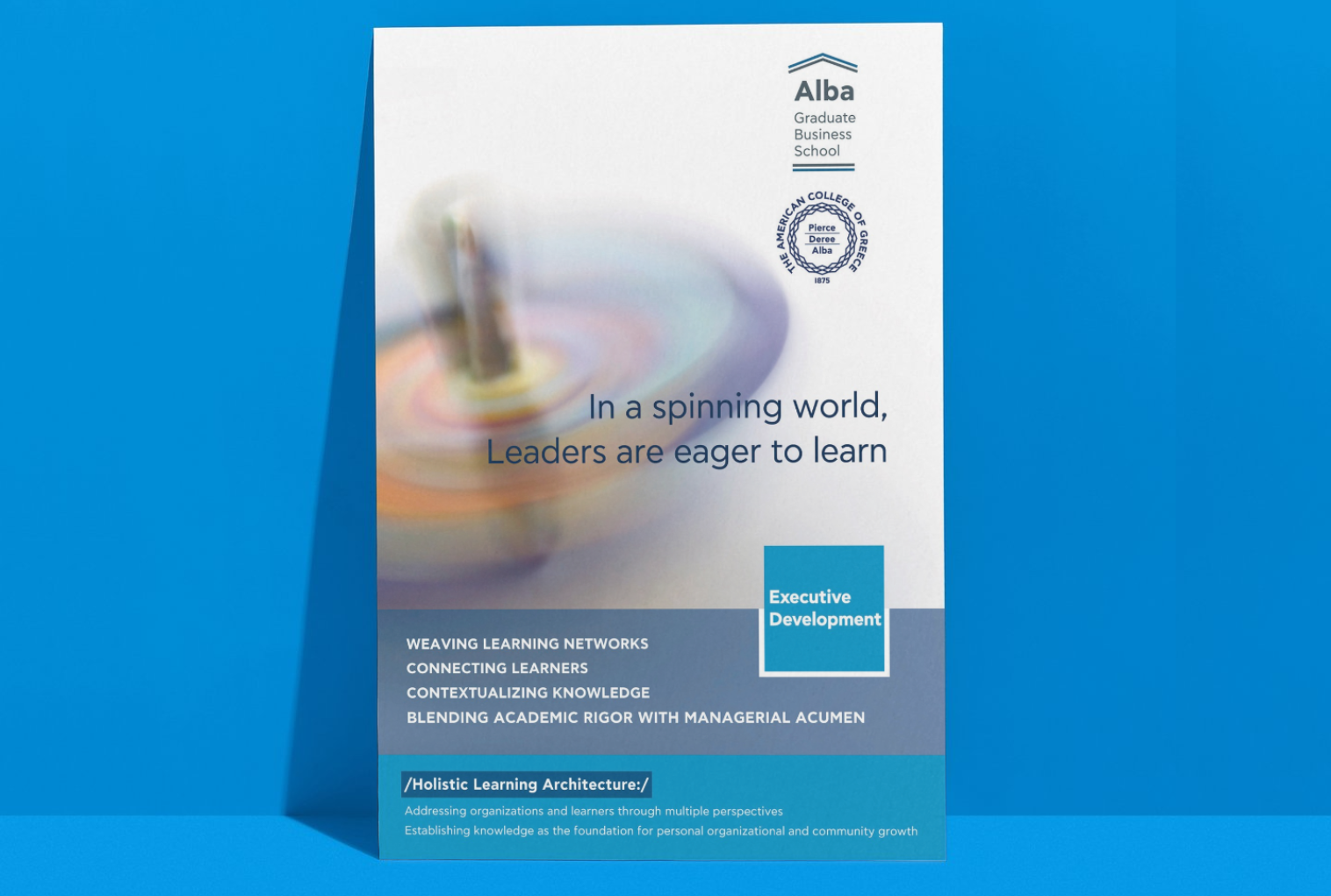Curiosity as the Catalyst for Innovation and Growth

On Thursday, June 20, 2024, the SEV Center of Excellence in Creative Leadership successfully concluded the academic year with an event titled "Leading with Curiosity: The Catalyst for Innovation and Growth." Costas Andriopoulos, Professor of Management and Associate Dean of MBA Programs at Bayes Business School, presented his research on how curiosity can be a strategic asset in fostering personal and professional growth, driving innovation, and enhancing decision-making for sustainable success. The event was held at the Alba premises and via live stream.

Professor Nikos Mylonopoulos, Director of the SEV Center of Excellence, kicked off the event by speaking about the overarching goals of the talk series, noting its critical role in merging theoretical knowledge with actionable insights. "Through these discussions, we aim to equip leaders with both theoretical and applied knowledge, helping them develop their capacity to navigate complex challenges," Mylonopoulos stated.

Dora Oikonomou, Director of Human Capital Affairs at SEV, contributed to the conversation by pointing out that curiosity is the driving force shaping our world. "Especially in the current business environment which presents us with complex challenges every day, we need innovative approaches to problem solving and business success," Oikonomou remarked.

Dean of Alba, Professor Kostas Axarloglou, took the podium and recounted a conversation with a Google executive explaining how the company seeks in their hiring process people with curiosity, humility, and adaptability. "These competencies are crucial for individuals who wish to thrive in environments characterized by rapid change and uncertainty," Axarloglou pointed out. He elaborated on how fostering curiosity is not only about acquiring knowledge but also about the willingness to unlearn outdated information and adapt to new realities.

During his talk, Professor Costas Andriopoulos developed the theme of curiosity, a topic he is personally passionate about. He began by reflecting on his lifelong curiosity, describing it as a fundamental aspect of his identity since early childhood. He then went on to share observations from numerous interviews with highly successful individuals from all walks of life, about how they channel their curiosity to find joy and purpose. Pointing out studies showing a dramatic drop in the number of questions adults ask daily compared to children, he emphasized the importance of rekindling this curiosity, noting that it is not merely an intellectual pursuit but also a source of personal and professional growth.

In his book titled “Purposeful Curiosity”, Professor Costas Andriopoulos clarifies that unlike casual or frivolous curiosity, purposeful curiosity is directed toward achieving specific goals and making meaningful progress. Curiosity, defined simply as a desire to learn, is an inherent trait in everyone. This intrinsic motivation drives people to seek knowledge and new experiences.
Fostering curiosity, Professor Andriopoulos suggested, involves asking open-ended questions, actively listening, and building trust. These techniques are essential for creating a culture where curiosity is encouraged and valued. He shared his research methodology, which included interviewing 63 individuals from diverse fields and geographies. These interviews provided insights into how different people harness their curiosity to achieve significant accomplishments, from business innovations to polar explorations. The importance of finding one's "itch" or passion was highlighted, with the professor explaining that focusing on something challenging, emotionally significant, and cognitively engaging can lead to deep and purposeful curiosity.
Addressing common barriers to curiosity, such as fear of judgment, lack of time, and societal expectations, Professor Costas Andriopoulos advocated for prioritizing curiosity and making deliberate efforts to explore and question, despite these obstacles. Practical tips for sparking curiosity included showing genuine interest in others, reframing questions to be more engaging, and seeking out diverse perspectives.

In the Q&A session, one audience member asked about focusing on problem-solving versus engaging in creative conversations. Andriopoulos advised that deep, focused time for individual problem-solving should be balanced with collaborative discussions to share findings and insights. This approach helps maintain active participation while diving deep in complex issues. Further, he suggested that doing thorough research, finding people passionate about similar topics, and engaging them in meaningful conversations can open doors and build productive relationships.

Addressing a question about fostering curiosity in a corporate environment, Professor Andriopoulos stressed the importance of making questioning task-related rather than personal. He highlighted the need for a supportive culture where asking questions is encouraged and seen as a sign of engagement and interest. A question about overcoming defensive reactions to questioning prompted the professor to recommend focusing on facts and evidence. By grounding questions in objective information, the conversation can remain constructive and less likely to trigger defensiveness.
Professor Costas Andriopoulos emphasized the importance of cultivating curiosity in education, suggesting that educators integrate questioning into their teaching methods. He shared examples of using questioning techniques in his own classes to encourage deeper engagement and critical thinking among students. Finally, he discussed how to maintain and develop purposeful curiosity over time. He recommended practicing curiosity regularly, seeking out new experiences, and continually challenging oneself to ask questions and explore new areas of interest.

You may watch the event here
Mark your calendars for more events in the Lead Creatively Discussion series of the SEV Center of Excellence in Creative Leadership in the Fall!
Have a great summer!







